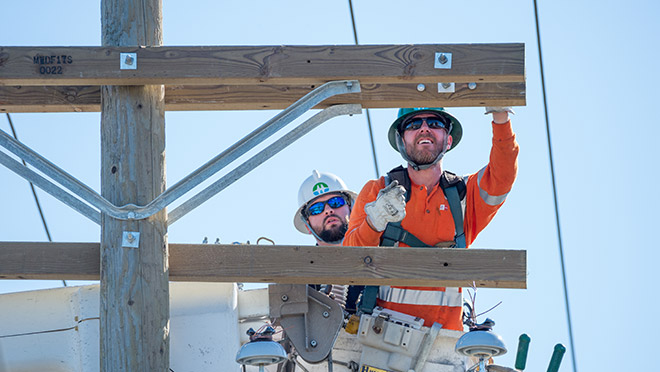Six things you need to know about upgrading your industrial electrical connection

No two connections are the same
From 2022 to 2023, our number of industrial electrical connections increased by 34%. And during the same period, the number of new commercial electric vehicle (EV) fast charging stations increased by over 100%.
While those are big increases, it's important to be aware of the amount of planning customers have to do for every single upgrade or EV connection. The complexity of these projects varies widely, so if you're considering an upgrade or connection project, what are the factors might impact your project plans? We spoke to Rupi Sandher, a mid-industrial Key Account Manager, to find out.
"We often have customers who jump in, purchase all their equipment and get all their electrical work done. And then when it comes time to connect, they issue a request to BC Hydro thinking that we can just come over and connect them. But that isn't how it works," explains Rupi. "There are many variables that BC Hydro has no control over, such as getting electrical permits from your municipality or jurisdictional authority under Technical Safety BC."
If you're planning anything that may increase your electrical consumption, from equipment upgrades to EV chargers, or even building a new facility, here are six things you should consider.
1. Let us know your plans as soon as possible
This part is critical. "The sooner you can talk to us, and we can determine your load requirements, the better it is for everybody involved," says Rupi. "This gives us time to plan, and it gives us an understanding of where load is available and where it's not. It also means that as a customer, you're going to be much more informed moving forward."
2. Are there any incentives available to you?
Another reason to talk to your Regional Energy Manager (REM) or Key Account Manager (KAM) as soon as possible is to see if there are any incentives available to help you. "We want to help customers get any qualifying incentive funding, but it needs to be approved in advance," says Rupi. "We can't reimburse any equipment or services purchased before incentive approval."
3. What's your capacity availability?
Even if your project doesn't qualify for any incentives, you might also want to hold off buying any new equipment until you've talked to us to understand how much electricity is potentially available for your location. "Capacity availability is a primary concern for so many customers right now. If it's there, that's great and it's seamless, but then in some areas where capacity is constrained, it can be a lengthy wait time," says Rupi "So it's better everybody knows that upfront, rather than have frustrating surprises later on."
4. Does your existing equipment support an upgrade?
We've explored some of the risks related to buying new equipment too soon. But what about your existing equipment and infrastructure? We can help you to identify all the areas that need updating to cope with an increased load. For instance, is your current wiring sufficient? And do you have any other equipment that might also need to be updated at the same time?
5. Do you need any permits?
Many industrial electrical upgrades also require some kind of infrastructure upgrade. This usually requires permits, which can vary in complexity depending on the city you're located in. "There's often a lot of approvals that need to take place. And when the project moves into the city's hands, everyone – including BC Hydro – has to wait for the outcome, says Rupi. "So understanding your city's permit requirements is a vital part of your project planning.
6. Will you be affected by supply chain issues?
Supply chain issues caused by the pandemic continue to be an issue in many industries. Like with permits, understanding the lead times for new equipment will help you to plan your project more realistically.
Are you considering an upgrade?
Whether you're considering EV chargers, a building full of heavy-duty equipment, or even just a regular service upgrade, Rupi's advice is the same: "Get in touch with BC Hydro as soon as possible and let us know what you're hoping to achieve so we can help you work out the best way to get there."
To find out more about electrical upgrades and service changes, see our Electrical service connections information or contact your Key Account Manager or Regional Energy Manager. You can also call 604 522 4713 in the Lower Mainland or 1 866 522 4713 elsewhere in B.C.